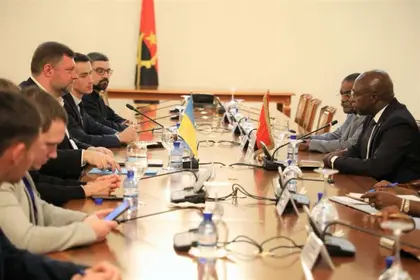A Ukrainian delegation to the Inter-Parliamentary Union (IPU) meeting in Luanda, the Republic of Angola, met with officials from numerous nations and discussed issues in relation to the ongoing war in Ukraine.
One of the more significant developments is that Cabo Verde, an island nation off the western coast of Africa, could be about to recognize the Holodomor as an act of genocide.
JOIN US ON TELEGRAM
Follow our coverage of the war on the @Kyivpost_official.
According to Zhan Beleniuk, a representative of Ukraine’s delegation, the IPU meeting has 170 parliaments worldwide in attendance, and the goal is to establish connections with countries that are unlikely to visit Ukraine and vice versa and improve communication with them.
“The main topics of our communication are food security, support of Ukraine at various international platforms — in particular, support of our resolutions at the UN and the ‘peace formula’ of President Zelensky, as well as joining the Crimean Platform,” said Beleniuk.
Food security has been an area of concern for African nations since the full-scale invasion. Russia has been conducting naval blockades and attacking Ukrainian warehouses in a bid to deprive Ukraine of its foreign exports and revenues, placing a huge strain on global food supplies in the process.
In connection with grains from Ukraine, the Holodomor, a manmade famine in Soviet Ukraine, is also among the topics of discussion for the Ukrainian delegation ahead of the catastrophe’s 90th anniversary in November. A meeting is due to take place with representatives from Cabo Verde which might be the first African country to recognize the Holodomor as an act of genocide, setting a precedent among African nations.

‘We Are Blocking Propagandists’ – Zelensky Imposes Sanctions on Pro-Russian Politicians
Africa’s stance on Russia’s war in Ukraine has been divided, with only 28 African nations supporting a UN resolution on March 2 last year that condemns the full-scale invasion, where 17 African nations, including Angola, abstained from voting.
In a meeting with Tete António, the foreign minister of Angola, Ukraine’s First Deputy Speaker Oleksandr Korniienko discussed Ukraine’s territorial security and food grain exports, particularly obstacles in grain exports due to Russia’s withdrawal from the Black Sea grain deal, as well as opportunities for future bilateral cooperation.
Korniienko then met with António Cuononoca, first deputy president of the national assembly of Angola, and informed him of Ukraine’s efforts and obligations to ensure world food security.
“I informed him about the situation with Ukrainian grain and ports. I assured him that we are aware of our responsibility in the food sector and are ready to export grain despite everything,” said Korniienko in an official statement.
Cuononoca also voiced his support for the UN’s Territorial Integrity resolution for Ukraine, which comes as a symbolic move in Ukraine’s efforts to consolidate support from African nations amidst the ongoing invasion.
Oleksandr Merezhko, chairman of Ukraine’s parliamentary Committee on Foreign Policy and Interparliamentary Cooperation, noted that perspectives from different nations are gradually changing, and the delegation is working to convince them that it is “in the interests of these countries to support Ukraine.”
“They are increasingly feeling the negative consequences of Russian aggression against Ukraine,” said Merezhko. “Food prices are rising, and this is exacerbating poverty in many countries of the Global South.”
However, Merezhko also said that there are also voices “aimed at diverting attention from Russian aggression,” where some African countries stressed that as much as one can talk about the war between Russia and Ukraine, one should talk about Palestine and Israel.
Russia has been known to utilize the anti-colonial sentiment in Africa to bolster pro-Russian narratives to great effect, and it has been involved in numerous conflicts using its government-funded private military companies to protect its interests in countries such as Mali and Central African Republic.
The Republic of Angola, a former Portuguese colony, gained independence in 1975 and its ruling party, the People’s Movement for the Liberation of Angola (MPLA), received military aid from the Soviet Union and direct military support from Cuba. At the end of the Cold War, MPLA denounced Marxist-Leninist ideology and turned pro-Western.
You can also highlight the text and press Ctrl + Enter










